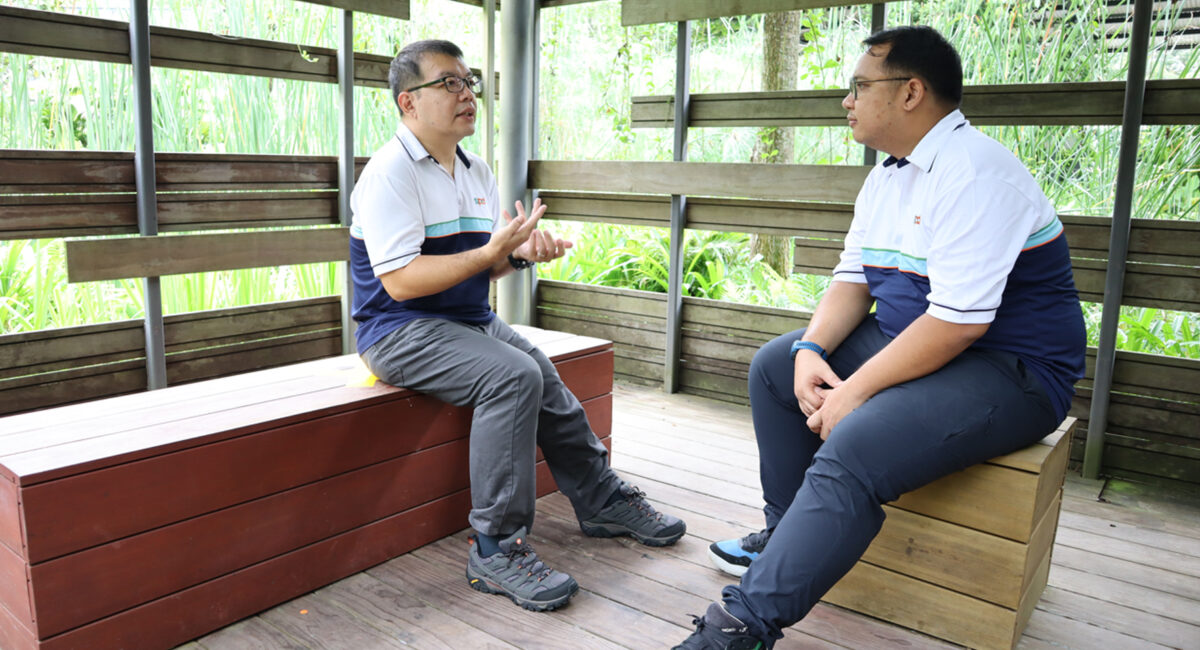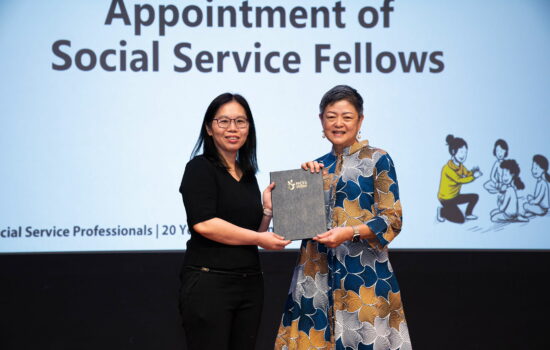As we conclude this week-long Social Work Day celebrations, our social worker Ishak Johari seeks out his senior, Goh Kee Choon, for some advice on carrying out their role effectively in today’s society, and also highlighting the importance of supervision in this profession.
Ishak: Kee Choon, you have been a social worker for over ten years now. How has your role evolved over time?
Kee Choon: When I first joined, the support provided were mainly financial assistance, distribution of grocery vouchers, assessing cases and providing counselling support. But our role has transformed far beyond that. For example, as a social worker in the disability field, we often come across clients with various disabilities and their caregivers who may need support in areas such as seeking employment, applying for schemes to get mobility devices, digital awareness training, establishing peer support groups, addressing psycho-social challenges and so on. In SPD’s Employment Support Programme which I’m supporting now, I sometimes meet young clients with disabilities who are homebound for years due to their condition. It is tough for some of them to find jobs because of their severe disability.
In this case, the support needed is more than just financial aid. We will find out from the clients their aspirations and with today’s technology and available resources, can we then link the clients so that they can do more? In essence, we are taking on the role of an advocate who instill the motivation in our clients, providing the link for them to achieve their dreams.
We also work with stakeholders like community partners, employers and volunteers, as well as taking on the role of a trainer conducting courses for both clients and professionals.

Ishak: This is something I can relate to as a social worker in the disability field. When I do home visits, my assessment starts right from the moment I reach the client’s estate. I will observe the surroundings – is it accessible? Is there a ramp? Besides the neighbourhood, I will also check the accessibility within the client’s home. All these observations are crucial in determining the support needed to help the client to live independently.
Kee Choon: That’s right. With technological advancement and demographical changes over the years, clients are also getting more tech-savvy these days. They can easily find the information they need online. But where we come in is to advise what they can do with the information, and which support are better suited for their needs. We want to empower them to be able to make informed decisions for themselves, and to self-advocate.
Ishak: With the ever-evolving landscape, we must stay nimble to adapt. Especially with the ongoing pandemic, how do you see us changing the way we deliver care?
Kee Choon: Our core work remains unchanged, but we have become more creative with the ways we provide support, especially during the period when restrictions prevent us from seeing the clients in person. Technology has also improved the way we do our work and has simplified some processes, reducing the time required to perform the tasks. In the past two years, the pandemic has also propelled and sped up more cross-agencies collaborations and I think this should continue post-Covid.

Ishak: While we strive to remain objective at all times, it can sometimes be challenging to keep our emotions in check, especially when we are managing cases that move us or that we can relate to.
Kee Choon: Yes, sometimes we will definitely feel emotional when we encounter such cases. I always say this to my supervisees – that we are also human and that it’s normal to feel emotional sometimes. However, as professionals, we need to develop a keen sense of self awareness and we must be able to have clear boundaries and be aware of our role. That’s why having a supervisory structure is important in helping us keep checks. We check in with our supervisors and have case conferences to ensure our actions and recommendations are sound.
A social worker will find himself on a slippery slope when he becomes emotionally invested in a case and feels that he is the only one who can help the client. Because that may deter him from referring the client out for other services that may be more suitable.
It is not wrong to want to help but we must be clear about what we can do within our role. If it is beyond our expertise, we will need to consider what resources or which agencies that we can link the clients up to for help. Not everything is upon yourself. Pulling the necessary resources together to support the client holistically – that is our role as a social worker.
Ishak: But in cases where we cannot help our clients as much as we want to, how would you advise us to navigate feelings of regret or guilt that may arise?
Kee Choon: As social workers, we can only help clients within the scope of what we are empowered to do. We can only support them as much as we can, and not as much as we want. I think we need to remind ourselves that there will be situations that we cannot support despite our best efforts and intentions.
For junior social workers who find it hard to process their feelings, it is of utmost importance to approach supervisors for guidance. Make use of the supervision sessions, or just have an informal chat will be good too. Don’t bottle-up all your feelings or difficulties until the monthly or fortnightly session with your supervisor. As “care providers”, the best way that we can be there for those who need us is to ensure that we ourselves are well taken care of.
However, if this is a case of not being able to help the clients because the junior lacks experience in certain areas, this is where the conversation between the junior and supervisor should focus on ways to improve and what the junior can and should be doing in certain cases.
Ishak: I would like to pick up on the point about self-care, which is definitely important for us as social workers. For me, I also strive to celebrate the little moments and achievements, as they serve as an important reminder to myself as to why I chose this field. As we wrap up, what is one advice you can offer to prospective social workers?
Kee Choon: If you are keen to work at a social service agency but are not sure if you are up for it, volunteer there first or speak to a social worker to find out more. It is a meaningful career to embark on, whether you are a mid-career switcher or student contemplating your options. If you have the heart to serve, do give this profession some consideration and you may be surprised by what it offers.
To our social workers who always strive to give their best to the clients and their families, we salute your dedication and professionalism. Wishing all a happy Social Work Day!





